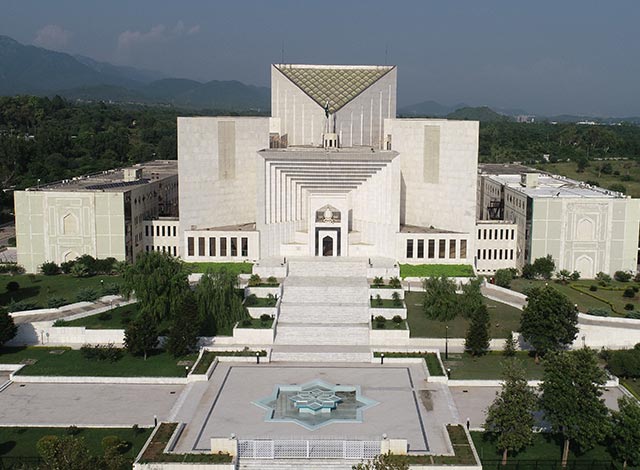Records show that the meeting was postponed at the request of the law minister and upon the suggestion of Justice Yahya Afridi.
A recent review of the Judicial Commission of Pakistan (JCP) records reveals that the meeting was postponed at the request of the law minister and upon the suggestion of Justice Yahya Afridi.
For several days, rumors have circulated suggesting that Chief Justice of Pakistan (CJP) Qazi Faez Isa postponed the JCP meeting in May to “facilitate the government’s judicial package,” which includes proposals to extend judges’ retirement age and potentially grant an extension to the chief justice.
However, legal expert and lawyer Reema Omer has challenged these speculations. Omer has referred to the JCP meeting minutes and a letter from the chief justice, which provide a different narrative.
It is also worth noting that the federal government has repeatedly denied any plans to extend the chief justice’s term, who is set to retire next month (October).
On social media platform X (formerly Twitter), Omer highlighted that the meeting’s postponement was requested by the federal law minister due to ongoing government discussions about “amending Article 175A of the Constitution” and potential changes to the Commission’s constitution.
Furthermore, according to the lawyer, the records indicate that Justice Yahya Afridi suggested deferring the discussion and postponing the JCP meeting due to the government’s plans to propose constitutional amendments—a suggestion that was agreed upon by all members. In addition to the JCP meeting’s records, the legal expert cites a letter from CJP Isa dated August 28, addressed to the chief justices of the four high courts. In this letter, CJP Isa stated that he had wanted the JCP meeting to proceed but that it was postponed in deference to the majority’s wishes.
CJP Isa noted, “The rules of the Judicial Commission of Pakistan, established in 2010, were under review to make the nomination process more transparent and democratic, as requested by bar councils and associations. I had constituted a committee to propose amendments to these rules. The committee’s report led to a meeting scheduled for May 3, 2024, to consider its recommendations. Although I wanted the meeting to proceed, it was postponed based on the majority’s preference. A new meeting has been called to review the committee’s recommendations.”
In his letter, the chief justice also requested the high court chief justices to begin the search for potential candidates for additional judges in their respective courts. The information from the meeting’s record and CJP Isa’s letter indicates that the postponement was due to the law minister’s request and Justice Afridi’s suggestion, contradicting the rumors suggesting otherwise.
The rumors about an extension were further fueled by a recent bill seeking to amend the Supreme Court (Number of Judges) Act, 1997, which was tabled in the Senate on Monday. This bill, titled “Supreme Court (Number of Judges) (Amendment) Act, 2024,” proposed increasing the number of Supreme Court judges from 17 to 21 to address the backlog of cases. Presented by independent Senator Mohammad Abdul Qadir from Balochistan, the bill aligns with similar legislation proposed by Pakistan Muslim League-Nawaz (PML-N) parliamentarian Daniyal Chaudhry in the National Assembly, which sought to raise the number of judges to 23—a move opposed by Pakistan Tehreek-e-Insaf (PTI).
The National Assembly bill was deferred after PTI Chairman Barrister Gohar Khan argued that such a bill involving federal expenditures could only be introduced by the government under Articles 74 and 81 of the Constitution, according to The News.
Federal Law Minister Azam Nazeer Tarar confirmed at an event in Islamabad on Monday that the CJP had expressed clearly to him and the Attorney General that he does not want an extension.










